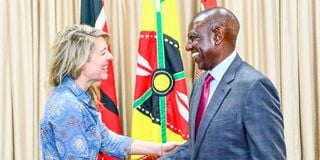Premium
President Ruto calls for talks in troubled Sudan

President William Ruto with Canadian Foreign Minister Ms Melanie Joly at State House, Nairobi on May 2, 2023.
President William Ruto has called out Sudan army chief General Abdel Fattah Burhan and Rapid Support Forces (RSF) Commander General Mohammed Hamdan Dagalo for their continued role in the internal conflict that has left a trail of disaster in the country.
Fighting between the two factions has entered the third week, with the United Nations estimating that more than 500 civilians have been killed in air strikes, gunfights and shelling as about 50,000 others flee to the neighbouring countries as efforts to hold peace talks between the two generals falter.
Dr Ruto said there was no reason for violence yet what the two are differing about can be solved through dialogue. He said Kenya is determined to stop the continent from sliding into military rule, an era, he said, belongs to the past.
“We want to send very clear signals to our brothers in Sudan that this continent will not entertain any military rule. They have no business whatsoever destroying the hard-earned years of developing Sudan. The bombing of buildings, hospitals and infrastructure is unacceptable ... we will hold them accountable,” said Dr Ruto.
He termed as unfortunate the unravelling transition after painstaking work.
“As Kenya, we will be playing our role [arbitrating the conflict] because we owe it to our brothers and sisters in Sudan,” he said.
He spoke during the launch of the first “State of Migration in East and Horn of Africa Report”, co-published by the East Africa Community (EAC), Inter-Governmental Authority on Development (Igad) and the International Organisation for Migration (IOM).
President Ruto further said that Kenya is happy to participate in stabilising countries that are in conflict, including the Eastern Democratic Republic of Congo (DRC) and Somalia.
“We are working with our brothers and sisters in Somalia to ensure that, even amid the drawdown of troops that is expected by next year, we have a concrete plan on how Somalia is going to move on as a State,” he said as he welcomed Somalia, Ethiopia and Sudan to join EAC to help build a much stronger, bigger and more prosperous regional body.
The report lays bare the state of migration in the East Africa region, where it is estimated that over 2,000 people migrate annually. East Africa is a source, transit and destination region for migrants. The migration is, however, irregular calling for increased cooperation amongst member states to mitigate against cross-border crime.
Dr Ruto said the small group of migrants who travel for the wrong reasons should, however, not limit those who travel for the right reasons as human mobility is key to promoting trade, wealth creation and regional integration.
Remove barriers
He urged countries to remove barriers to the movement of people as it impedes the transfer of ideas and opportunities.
“As a country, we have taken the policy decision that any African from any part of our continent is free to come to Kenya without acquiring a Visa prior to the visit, we can give them a visa at the airport,” said President Ruto. He, however, noted that increased migration to Europe through the Mediterranean Sea was presenting a challenge.
“I dare say that it is a very temporary problem as migration will be in the opposite direction shortly,” Dr Ruto said.
He said Kenya remains committed to ensuring that refugees living in the country are treated with dignity, provided with the necessary support, and considered — as well as actively involved — in national development plans in order to facilitate their successful integration.
Igad Executive Secretary Workneh Gebeyehu noted that the current war in Sudan was having a negative impact on migration and displacement trends in the region.
“Statistics indicate that thousands of our brothers [in Sudan] and sisters are fleeing the violence, significantly adding to the displacement burden in the Igad region,” he said in a statement read on his behalf by Dr Fatuma Adan, the Igad Head of Mission to Kenya.
The regional body is calling for a coordinated response strategy towards migration and the implementation of its police framework (2012).
EAC Secretary-General Peter Mathuki noted that the East and Horn of Africa have historically been part of the global migration and trading networks and continue to play an important role in both.
With a total of 18 countries and a population of close to about 500 million, Mr Mathuki observed, the sub-region hosts close to eight million immigrants either in the form of refugees, asylum seekers or people looking for opportunities.
“In EAC, we host close to three million immigrants, particularly refugees. Uganda hosts the highest with close to 1.6 million refugees, followed by Kenya with about 500,000 and DRC, South Sudan, Tanzania, Rwanda and Burundi,” said Mr Mathuki.
He added that, despite the challenges of hosting migrants, the EAC region rakes in an estimated $15 billion (approximately Sh2 trillion) in remittances from the diaspora.




